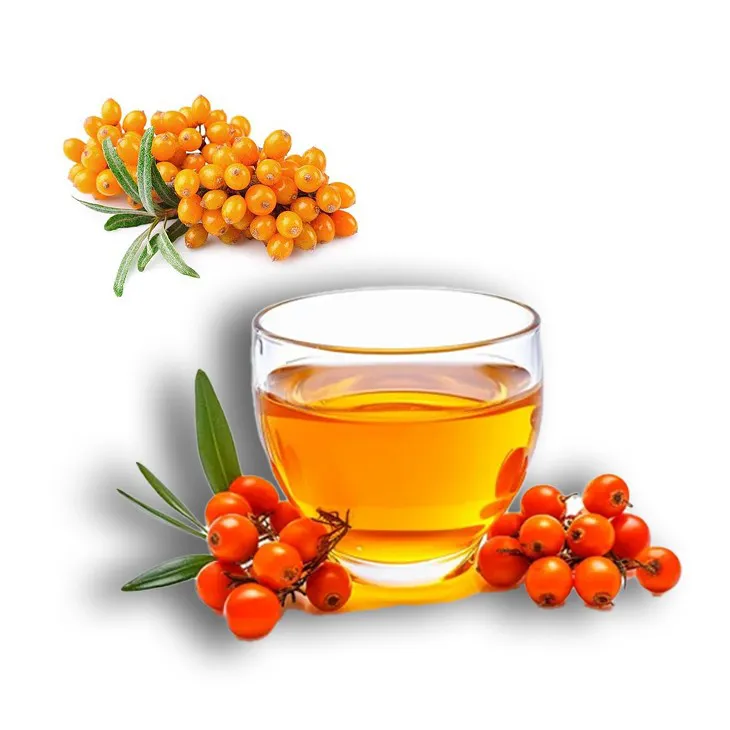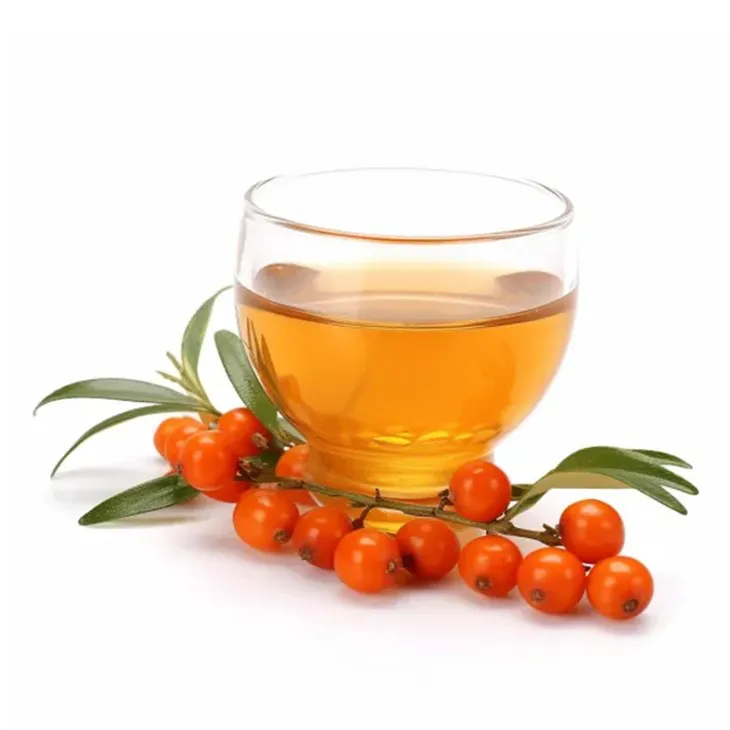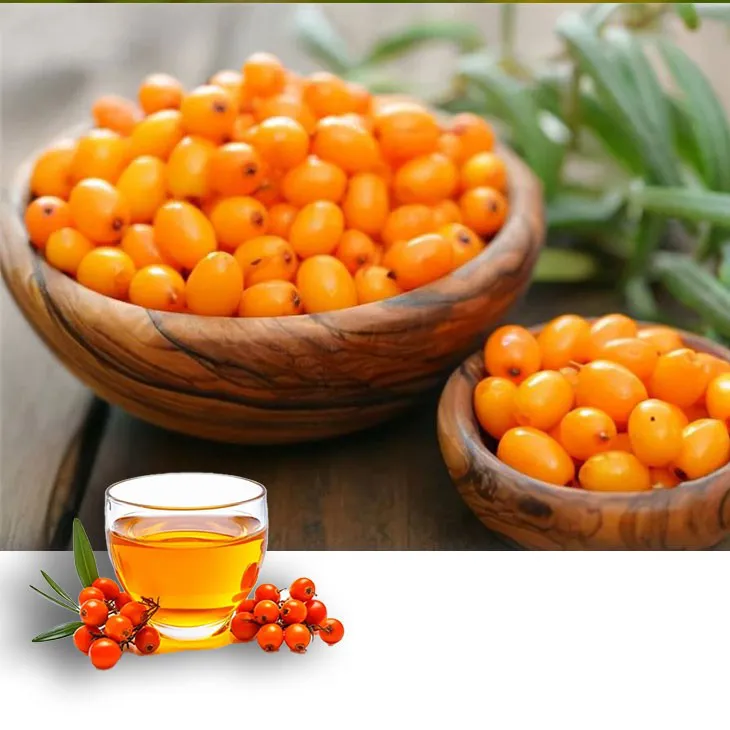- 0086-571-85302990
- sales@greenskybio.com
The Best Types of Sea Buckthorn Oil: A Guide to Choosing the Best Sea Buckthorn Oil
2024-11-12

1. Introduction
Sea - buckthorn oil has been increasingly recognized for its wide range of health benefits. It is rich in vitamins, fatty acids, and antioxidants, making it a popular choice for various applications, from skin care to dietary supplementation. However, with the growing market, it becomes crucial to understand how to choose the best sea - buckthorn oil. This article aims to provide a comprehensive guide on this matter.

2. Understanding Sea - Buckthorn
Sea - buckthorn (Hippophae rhamnoides) is a shrub that is native to Europe and Asia. It grows in harsh environments, such as coastal areas and high - altitude regions. The berries of the sea - buckthorn plant are the main source for extracting the oil. These berries are bright orange in color and are packed with nutrients.
2.1 Nutritional Profile
Sea - buckthorn berries are a rich source of vitamins, especially vitamin C, vitamin E, and vitamin K. They also contain high levels of omega - 3, omega - 6, omega - 7, and omega - 9 fatty acids. Additionally, they are loaded with antioxidants such as carotenoids and flavonoids. All these components contribute to the health - promoting properties of sea - buckthorn oil.

3. Extraction Methods
The method of extraction plays a significant role in determining the quality of sea - buckthorn oil. There are mainly two extraction methods: cold - press extraction and solvent extraction.
3.1 Cold - Press Extraction
- Advantages: Cold - press extraction is considered a more natural method. It involves mechanically pressing the sea - buckthorn berries to extract the oil without the use of heat or chemicals. This helps to preserve the natural nutrients and bioactive compounds in the oil. The resulting oil has a higher quality in terms of its nutritional value. - Disadvantages: The yield of cold - press extraction is relatively low compared to solvent extraction. This can make the cold - pressed sea - buckthorn oil more expensive.
3.2 Solvent Extraction
- Advantages: Solvent extraction can achieve a higher yield of oil from the sea - buckthorn berries. It is a more efficient method in terms of quantity. - Disadvantages: However, this method often involves the use of solvents such as hexane. Although the final product should be free from solvent residues if processed correctly, there is still a risk of trace amounts of solvents remaining in the oil. Also, the high - temperature and chemical processes in solvent extraction may damage some of the heat - sensitive and chemically reactive nutrients in the oil.

4. Quality Indicators
When choosing sea - buckthorn oil, several quality indicators should be considered.
4.1 Purity
- High - purity sea - buckthorn oil is free from contaminants such as pesticides, heavy metals, and other impurities. Look for products that are certified organic or have undergone strict quality control tests for purity. - The purity of the oil can also be affected by the extraction and processing methods. For example, solvent - extracted oils may have a higher risk of containing solvent residues if not properly purified.
4.2 Origin of the Sea - Buckthorn Berries
- Wild - Grown vs. Cultivated: Sea - buckthorn berries can be either wild - grown or cultivated. Wild - grown sea - buckthorn is often considered more "natural" and may have a different nutrient profile compared to cultivated varieties. However, it is important to ensure that wild - harvested berries are sourced sustainably. - Geographical Origin: The geographical origin of the sea - buckthorn berries can also impact the quality of the oil. Different regions may have different soil conditions, climates, and growing practices, which can influence the nutrient content of the berries and, consequently, the oil. For example, sea - buckthorn grown in high - altitude regions may have a higher concentration of certain antioxidants.

5. Different Grades of Sea - Buckthorn Oil and Their Uses
Sea - buckthorn oil comes in different grades, which are suitable for different purposes.
5.1 Cosmetic - Grade Sea - Buckthorn Oil
- Skin Health Benefits: Cosmetic - grade sea - buckthorn oil is often used in skin care products. It is rich in fatty acids, especially omega - 7, which is beneficial for maintaining skin hydration, reducing inflammation, and promoting skin repair. It can be used to treat various skin conditions such as dry skin, eczema, and acne. - Formulations: This grade of oil is commonly found in creams, lotions, serums, and oils for topical application. It can be used alone or in combination with other skin - friendly ingredients.
5.2 Dietary - Supplement - Grade Sea - Buckthorn Oil
- Health Benefits for the Body: Dietary - supplement - grade sea - buckthorn oil is designed for internal consumption. It provides the body with a rich source of vitamins, fatty acids, and antioxidants. It can help improve cardiovascular health, boost the immune system, and support digestive health. - Dosage and Administration: When taking sea - buckthorn oil as a dietary supplement, it is important to follow the recommended dosage instructions. The dosage may vary depending on factors such as age, health condition, and the specific product.
6. How to Read Product Labels
Reading product labels is essential when choosing the best sea - buckthorn oil.
6.1 Ingredient List
- Check for the purity of the sea - buckthorn oil. Make sure that there are no unnecessary additives or fillers. If the product contains other ingredients, such as preservatives or flavorings, ensure that they are safe and of high quality. - Look for information about the extraction method. If it is a cold - pressed oil, it may be indicated on the label. This can give you an idea of the quality of the oil in terms of nutrient preservation.
6.2 Certification Marks
- Look for organic certification marks if you prefer organic products. Organic sea - buckthorn oil is produced without the use of synthetic pesticides, fertilizers, or genetically modified organisms. - Other certifications, such as quality control certifications from recognized organizations, can also indicate that the product has met certain standards for purity, safety, and quality.
7. Price Considerations
Price can be an important factor when choosing sea - buckthorn oil.
7.1 Factors Affecting Price
- Extraction Method: As mentioned earlier, cold - pressed sea - buckthorn oil is generally more expensive due to its lower yield and more natural extraction process. Solvent - extracted oil may be cheaper but may have some potential quality drawbacks. - Quality and Purity: Higher - quality, purer sea - buckthorn oil with strict quality control measures will usually cost more. This includes oils that are sourced from high - quality berries and are free from contaminants. - Brand and Packaging: Well - known brands may charge a premium for their products. Also, the packaging can affect the price. For example, products with more elaborate or environmentally friendly packaging may be more expensive.
7.2 Value for Money
When considering the price, it is important to also think about the value for money. A more expensive product may be worth the investment if it offers higher quality, better purity, and more effective results. However, it is also possible to find good - quality sea - buckthorn oil at a more affordable price, especially if you do your research and compare different products.
8. Conclusion
Choosing the best sea - buckthorn oil requires consideration of various factors, including the extraction method, quality indicators such as purity and origin, the grade of the oil for specific uses, how to read product labels, and price. By understanding these aspects, you can make an informed decision and select a sea - buckthorn oil that meets your needs, whether it is for skin health, dietary supplementation, or other purposes.
FAQ:
What are the different extraction methods of sea - buckthorn oil?
There are mainly cold - press extraction and solvent extraction methods. Cold - press extraction is considered more natural as it doesn't involve the use of chemical solvents. It helps to preserve the natural nutrients and properties of the sea - buckthorn berries. Solvent extraction, on the other hand, can extract a larger amount of oil but may leave some solvent residues if not properly purified.
How can we determine the purity of sea - buckthorn oil?
One way is to look at the product label for information on any additives or fillers. High - purity sea - buckthorn oil should have minimal or no added substances. Another method is through laboratory analysis, which can accurately measure the composition of the oil. Also, a pure sea - buckthorn oil typically has a characteristic color, smell, and consistency.
Does the origin of sea - buckthorn berries affect the quality of the oil?
Yes, it does. Sea - buckthorn berries grown in different regions may have different levels of nutrients due to variations in soil quality, climate, and farming practices. For example, berries grown in unpolluted areas with rich soil and optimal sunlight exposure are likely to produce higher - quality oil with more beneficial compounds.
What are the specific benefits of sea - buckthorn oil for skin health?
Sea - buckthorn oil is rich in vitamins A, C, and E, as well as essential fatty acids. These nutrients help to moisturize the skin, reduce inflammation, and promote skin cell regeneration. It can be used to treat various skin conditions such as eczema, acne, and dry skin.
How should sea - buckthorn oil be used for dietary supplementation?
The recommended dosage varies depending on factors such as age, health condition, and the specific product. Generally, it can be taken orally in the form of capsules or added to food or drinks. However, it is important to consult a healthcare professional before starting any new dietary supplement to ensure it is safe and appropriate for you.
Related literature
- The Health Benefits of Sea - Buckthorn Oil: A Comprehensive Review"
- "Sea - Buckthorn Oil: Quality Assessment and Therapeutic Applications"
- "Selection Criteria for High - Quality Sea - Buckthorn Oil"
- ▶ Hesperidin
- ▶ Citrus Bioflavonoids
- ▶ Plant Extract
- ▶ lycopene
- ▶ Diosmin
- ▶ Grape seed extract
- ▶ Sea buckthorn Juice Powder
- ▶ Fruit Juice Powder
- ▶ Hops Extract
- ▶ Artichoke Extract
- ▶ Mushroom extract
- ▶ Astaxanthin
- ▶ Green Tea Extract
- ▶ Curcumin
- ▶ Horse Chestnut Extract
- ▶ Other Product
- ▶ Boswellia Serrata Extract
- ▶ Resveratrol
- ▶ Marigold Extract
- ▶ Grape Leaf Extract
- ▶ New Product
- ▶ Aminolevulinic acid
- ▶ Cranberry Extract
- ▶ Red Yeast Rice
- ▶ Red Wine Extract
-
Kidney Bean Extract
2024-11-12
-
melatonin extract
2024-11-12
-
Lemon Juice Powder
2024-11-12
-
Kupilu Extract
2024-11-12
-
Moringa powder
2024-11-12
-
Acai Berry Extract
2024-11-12
-
Curcumin
2024-11-12
-
Lavender Extract
2024-11-12
-
Buckthorn bark extract
2024-11-12
-
Hedyotis Diffusa Extract
2024-11-12





















